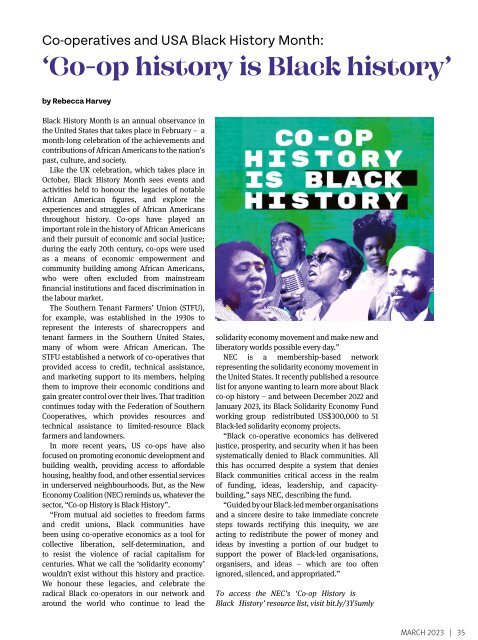Co-op News March 2023
The March edition of Co-op News: connecting, challenging and championing the global co-operative movement. This issue includes a special news report on the response by co-ops to the earthquake disasters in Syria and Turkey. And we look at US Black History Month, International Women's Day and the UK Fairtrade Fortnight - including our shopping guide for a range of fabulous Fairtrade gifts. Plus reports from the Future Co-ops and UKSCS conferences, as the movement looks to define its role in dealing with the multiple crises facing the world. And there are features on waste picker co-ops in South America, the circular economy in Quebec and and the UN's Sustainable Development agenda.
The March edition of Co-op News: connecting, challenging and championing the global co-operative movement. This issue includes a special news report on the response by co-ops to the earthquake disasters in Syria and Turkey. And we look at US Black History Month, International Women's Day and the UK Fairtrade Fortnight - including our shopping guide for a range of fabulous Fairtrade gifts. Plus reports from the Future Co-ops and UKSCS conferences, as the movement looks to define its role in dealing with the multiple crises facing the world. And there are features on waste picker co-ops in South America, the circular economy in Quebec and and the UN's Sustainable Development agenda.
You also want an ePaper? Increase the reach of your titles
YUMPU automatically turns print PDFs into web optimized ePapers that Google loves.
<strong>Co</strong>-<strong>op</strong>eratives and USA Black History Month:<br />
‘<strong>Co</strong>-<strong>op</strong> history is Black history’<br />
by Rebecca Harvey<br />
Black History Month is an annual observance in<br />
the United States that takes place in February – a<br />
month-long celebration of the achievements and<br />
contributions of African Americans to the nation’s<br />
past, culture, and society.<br />
Like the UK celebration, which takes place in<br />
October, Black History Month sees events and<br />
activities held to honour the legacies of notable<br />
African American figures, and explore the<br />
experiences and struggles of African Americans<br />
throughout history. <strong>Co</strong>-<strong>op</strong>s have played an<br />
important role in the history of African Americans<br />
and their pursuit of economic and social justice;<br />
during the early 20th century, co-<strong>op</strong>s were used<br />
as a means of economic empowerment and<br />
community building among African Americans,<br />
who were often excluded from mainstream<br />
financial institutions and faced discrimination in<br />
the labour market.<br />
The Southern Tenant Farmers’ Union (STFU),<br />
for example, was established in the 1930s to<br />
represent the interests of sharecr<strong>op</strong>pers and<br />
tenant farmers in the Southern United States,<br />
many of whom were African American. The<br />
STFU established a network of co-<strong>op</strong>eratives that<br />
provided access to credit, technical assistance,<br />
and marketing support to its members, helping<br />
them to improve their economic conditions and<br />
gain greater control over their lives. That tradition<br />
continues today with the Federation of Southern<br />
<strong>Co</strong><strong>op</strong>eratives, which provides resources and<br />
technical assistance to limited-resource Black<br />
farmers and landowners.<br />
In more recent years, US co-<strong>op</strong>s have also<br />
focused on promoting economic devel<strong>op</strong>ment and<br />
building wealth, providing access to affordable<br />
housing, healthy food, and other essential services<br />
in underserved neighbourhoods. But, as the New<br />
Economy <strong>Co</strong>alition (NEC) reminds us, whatever the<br />
sector, “<strong>Co</strong>-<strong>op</strong> History is Black History”.<br />
“From mutual aid societies to freedom farms<br />
and credit unions, Black communities have<br />
been using co-<strong>op</strong>erative economics as a tool for<br />
collective liberation, self-determination, and<br />
to resist the violence of racial capitalism for<br />
centuries. What we call the ‘solidarity economy’<br />
wouldn’t exist without this history and practice.<br />
We honour these legacies, and celebrate the<br />
radical Black co-<strong>op</strong>erators in our network and<br />
around the world who continue to lead the<br />
solidarity economy movement and make new and<br />
liberatory worlds possible every day.”<br />
NEC is a membership-based network<br />
representing the solidarity economy movement in<br />
the United States. It recently published a resource<br />
list for anyone wanting to learn more about Black<br />
co-<strong>op</strong> history – and between December 2022 and<br />
January <strong>2023</strong>, its Black Solidarity Economy Fund<br />
working group redistributed US$300,000 to 51<br />
Black-led solidarity economy projects.<br />
“Black co-<strong>op</strong>erative economics has delivered<br />
justice, prosperity, and security when it has been<br />
systematically denied to Black communities. All<br />
this has occurred despite a system that denies<br />
Black communities critical access in the realm<br />
of funding, ideas, leadership, and capacitybuilding,”<br />
says NEC, describing the fund.<br />
“Guided by our Black-led member organisations<br />
and a sincere desire to take immediate concrete<br />
steps towards rectifying this inequity, we are<br />
acting to redistribute the power of money and<br />
ideas by investing a portion of our budget to<br />
support the power of Black-led organisations,<br />
organisers, and ideas – which are too often<br />
ignored, silenced, and appr<strong>op</strong>riated.”<br />
To access the NEC’s ‘<strong>Co</strong>-<strong>op</strong> History is<br />
Black History’ resource list, visit bit.ly/3Y5umly<br />
MARCH <strong>2023</strong> | 35

















